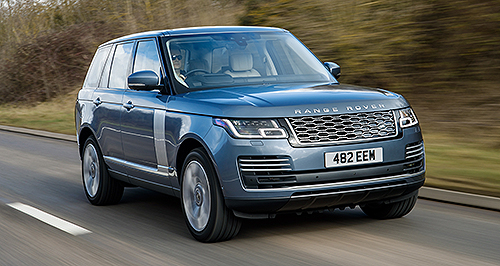News - JaguarJLR calls for Victorian tax rethinkTax on a tax: The hulking Range Rover upper-large SUV is subject to a second helping of luxury car tax (LCT) in Victoria and Queensland. Lower car sales and other negative impacts outweigh state tax revenue benefit: JLR20 Aug 2019 JAGUAR Land Rover (JLR) Australia has added to the chorus of dissent over the Victorian state government’s recently introduced super-luxury tax on vehicles costing more than $100,000, stating that it could not have come at a worse time for the embattled automotive industry in Australia.
In an interview with GoAuto, JLR Australia managing director Mark Cameron called for an immediate abolition of the tax implemented from July 1, 2019, which comes on top of the federal government’s luxury car tax, reasoning that it will only impact new-vehicle sales and lead to job losses in the automotive industry.
According to Mr Cameron, fewer sales would impose extra burden on the Victorian government’s finances and would serve as an ‘own goal’ for the state, with its negative impact – alongside rising unemployment – outweighing the extra revenue projected.
“The taxation regime is unfair,” he said. “What we’ve seen happening in Victoria is that car owners and car buyers seem to be the easy target. We don’t see the extra taxation on other luxury goods, and at a time when the market is down and we have lots of jobs employed in retailing, the extra taxation really isn’t going to help.
“And, actually, in the case of Victoria, I really doubt whether they’re going to raise the revenues that are being expected because buyers are going to change their behaviour. And that could result in more depression in the car industry and more job losses.
“It’s just disappointing. In many cases, people have worked hard, built businesses, developed their careers, to be in a position to buy a more premium car, and then they get slapped with this level of taxation. It’s one of the issues in Australia that needs reform.”
Although it is too soon to assess the impact of the Victorian tax, new-vehicle sales in the state for July – the first full month of the tax – were down 8.5 per cent year-on-year, which was slightly worse than the national average of 7.7 per cent.
While sales of upper-large sedans costing more than $100,000 fell by nearly 35 per cent and sportscars over $80,000 slid by 2.8 per cent last month, registrations of SUVs costing more than $100,000 rocketed by 35 per cent.
Victoria was the second-largest new-vehicle market in July, accounting for 29.1 per cent of total volume, just behind New South Wales at 31.7 per cent.
Mr Cameron believes introducing a usage-based tax would be a more effective and fairer way of raising revenue from motorists than a prohibitively high blanket tax at the point of purchase.
“Clearly there’s a lot of revenue raised by that (luxury car tax) and whatever measure you do will be unpopular in some regard,” he said.
“(I suggest) some sort of taxation system that pays for usage – so whether it’s road charging or extra duty on fuel – those that use their car pay more, rather than just a blatant, ‘You hit a price point and then you pay more just because you can afford to.’ I think it needs a bit of a rethink in terms of other options out there.
“More duty on fuel is never going to be popular, and some people will say, ‘Well, then you’re taxing those that are less well-off equally’. But I think we need something that redresses the balance and reforms the taxation system that was only really there to protect an (Australian vehicle manufacturing) industry that isn’t really there (anymore).”
JLR’s calls echo those of the Australian automotive industry’s dismay at the new Victorian tax, which sees a duty applied of seven per cent of the market value for new vehicles priced between $100,000 and $150,000, and a nine per cent slug for those at $150,000 and above.
Only low-emission vehicles and vehicles operated in the business of primary production are exempt.
Victoria’s super-luxury tax follows that of Queensland’s introduction last year of an LCT of two per cent on the dutiable value of new vehicles priced over $100,000. The federal LCT, meanwhile, remains at a rate of 33 per cent for every dollar over $67,525, or $75,526 for new vehicles with an average fuel consumption figure below 7.0 litres per 100 kilometres.
The FCAI has repeatedly called for the cessation of the federal LCT ever since it was introduced by the Howard government in 2001 to protect Australian car manufacturing, and particularly since the final Australian-made vehicle rolled off the assembly line in October 2017.  Read more |
Click to shareJaguar articlesResearch Jaguar Motor industry news |















Facebook Twitter Instagram